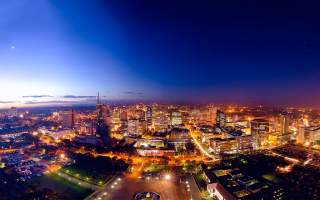Is Africa the Next Big Economic Success Story?
A hodgepodge of modernization and tradition, Africa has the second-fastest growth rate in the world.
However, without support and investment in developments that will ensure technological infrastructure can function—such as regular electricity for schools that train programmers or safe areas for hardware and towers for cell phone signals to reach users consistently—the advances will be limited, particularly in technologies used for interaction. Costs for internet access already vary dramatically. They range from $3037 per one million bits per second in Chad to eight dollars in Ghana. Some companies, like Facebook, are trying to address the issue of access, but they can only go so far, and there is no guarantee they will continue if it no longer makes sense for their business. If governments are not willing to invest in developing the infrastructure necessary, then the ability to advance remains deficient. Equally important, if governments are not willing to regulate the sector so that it functions well, then the utility of such technology will be diminished. This is particularly true when there are no regulations or accountability systems in place to control when governments can “turn off” access to social-networking sites by blocking internet access, as has happened during election seasons in several countries.
Throes of Democracy
Democracy has been hailed as an antidote to some of the challenges modernization has wrought in Africa. Most recently, former U.S. ambassador Michael McFaul called on the Trump administration to continue America’s democracy promotion efforts. “[Democracies] are more stable than other forms of government because they offer a peaceful, institutionalized mechanism for transferring power,” he said. Indeed, most African countries have held multiparty elections in the last two decades, and there have been some recent, high-profile, peaceful transfers of power. But even as democracies tend to be more stable and promote more sustainable growth, democratization—the process through which countries become a democracy—tends to do the opposite. This is where most of Africa stands today: in the throes of democracy, but not democratic. In many cases, incumbents and strongmen have instrumentalized the language of democracy by conducting flawed elections and reinterpreting constitutional term limits—some unilaterally by incumbents, and others through legislation supported by popular referendum. It has given illegitimate leaders an excuse for delaying or denying the democratic process. At worst, it has allowed them to rule through complexity and bureaucracy. In both cases, however, labels such as “democracy” disguise the entanglement of modernity with tradition in the African democratization process.
So if democracy is stable and growth-promoting, but the process through which it is achieved is unstable and uncertain, what’s needed is more focus on bridging the gap from nondemocratic to democratic. Here, the answer may be investing in institutions. But what kinds of institutions? The conventional wisdom is that formal institutions—rule of law, constitution, checks and balances—are critical precursors for stability and democracy. But efforts to build or reshape institutions in the developing world often fail. From 2006–11, public, sector institutional reforms were featured in over $50 billion worth of World Bank sponsored projects, but fewer than 40 percent of the eighty countries receiving World Bank support for public-sector reform had improved governance scores. Arguably more important are informal institutions, which evolve at the pace of the society at large. These institutions are typically religious associations, which provide health-care services, alternative land court systems that administer land ownership, and member-based asset-management clubs that manage retirement funds. These types of institutions act as absorptive bodies that mop up latent sources of instability, and balance interests and use the benefits of scale to reduce transaction costs. In a sense, they accomplish the same kinds of things formal institutions do, but they do it by balancing the traditional with the modern. As this author, I have argued in the past, investing “in the grain” of society through these institutions is important, especially as formal institutions struggle to achieve buy-in and influence on a wide scale. Refocusing efforts on understanding which institutions would benefit from what forms of assistance should be a priority.
Africa is not the only region where modernity clashes with tradition, nor is it the region where the conflict is most consequential. But it may be the region where it is the most conspicuous—from the everyday interaction at an airport to the tectonic trends driving the continent forward (and backwards). Whether the continent falls back, or leapfrogs forward, will largely be defined by how well existing institutions develop to harness the ongoing and far reaching changes in demographics, technology, urbanization and political development. In the absence of well-functioning and forward-looking institutions able to close the gaps created by modernization and tradition, the continent will continue its “two steps forward, one step back” growth pattern, which has left countries struggling or stagnating.
Eliot Pence is a Director at McLarty Associates, where he advises Fortune 200 firms and private investors on market entry and expansion strategies. He is the Executive Director of the US-Nigeria Council, a 501(c)3 focused on building targeted partnerships between Nigerian and American investors. In 2014, Eliot co-founded the Africa Expert Network, a technology platform focused on expediting deal origination and due diligence. Eliot is an Adjunct Fellow at the America Security Project and serves on the board of the Africa Leadership Network.
Image: Central Nairobi at night. Wikimedia Commons/Creative Commons/Mutua Matheka

